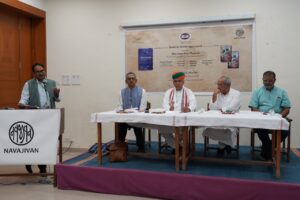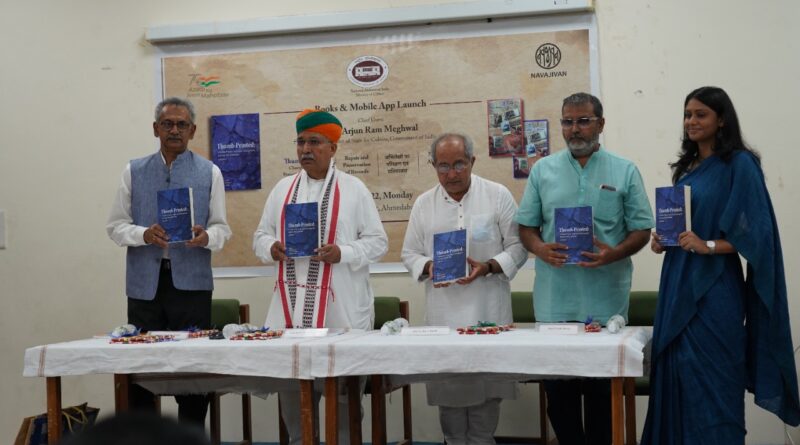Navajivan Trust celebrates ‘Azadi Ka Amrit Mahotsav’ in style
Navjivan trust launches books titled – a) Thumb Printed: Champaran Indigo Peasants speak to Gandhi, Volume-1, b) Repair and Preservation of Records, c) Abhilekhon ka Parirakshan evam Pratisanskar and mobile app of Abhilekh Patal
BILKULONLINE
By Rafat Quadri
Ahmedabad, June 21: As part of Azadi Ka Amrit Mahotsav (India @75) National Archives of India and Navajivan Trust is going to launch books titled – a) Thumb Printed: Champaran Indigo Peasants speak to Gandhi, Volume-1, b) Repair and Preservation of Records, c) Abhilekhon ka Parirakshan evam Pratisanskar and mobile app of Abhilekh Patal at Navajivan Trust, Ahmedabad on Monday, the 20th june.
Arjun Ram Meghwal , Minister of State for Culture, Government of India has was the chief guest of the function.
The book Thumb Printed: Champaran Indigo Peasants speak to Gandhi, Volume-1 captures the voices of the peasants of Champaran Satyagraha through the statements made by them to Gandhiji, Rajendra Prasad and his team. This volume is a rich introduction to the testimonies of the peasants and provides rich insights into the condition of the indigo peasants and the makings of Gandhiji’s Champaran Satyagraha. The book Repair and Preservation of Records is an essential handbook for all record managers, and it provides solutions to overcome the problems of preservation and provide longevity to the collection, care in handling, use, display and transit.
The Hindi version of the book, Abhilekhon ka Parirakshan aur Pratisanskar was also inaugurated at the occasion. National Archives of India is introducing a Mobile App for Abhilekh Patal, its web portal https://www.abhilekh-patal.in/jspui/, covering various powerful features including advance search for online access to 3.3 million pages of digitized records to which about 40000 pages are being added daily. Over 2.7 million reference media collection held by National Archives of India are also available, which have been accessed by over 10000 users spread across 202 countries.
The app can be downloaded from the Google Play Store and Mobile Seva Platform. Navajivan Trust is the publishing house and printing press founded by Mahatma Gandhi in 1919, starting with the Journal with same name Navajivan in Gujarati. Navajivan Institution has played pivotal role in Indian freedom struggle, mainly by publishing the papers through which Gandhiji could communicate with the masses of the country. It also brought out reforms by publishing various Gandhian books time to time expressing his thoughts on almost every subject which addresses personal and social uplift. Gandhiji declared Navajivan as custodian of his copyrights in his will dated 1940.
The present campus of Navajivan was inaugurated by Sardar Vallabhbhai Patel, as Chairman of the Trust. The trust has so far published more than 1000 titles including Gandhiji’s autobiography in 18 Indian languages. The National Archives of India is an Attached Office under the Ministry of Culture. It was established on 11 March 1891 at Kolkata (Calcutta) as the Imperial Record Department. Following the transfer of the capital from Calcutta to Delhi in 1911, the present building of the National Archives of India was constructed in 1926 which was designed by Sir Edwin Lutyens. The transfer of all records from Calcutta to New Delhi was completed in 1937.
It is the nodal agency for the implementation of the Public Records Act, 1993 and Public Record Rules, 1997. National Archives of India has at present in its repositories a collection of over 18.50 cr. pages of Public Records, which include files, volumes, maps, bills assented to by the President of India, treaties, rare manuscripts oriental records, private papers, cartographic records, important collection of Gazettes and Gazetteers, Census records, assembly and parliament debates, proscribed literature, travel accounts etc. A major chunk of Oriental records are in Persian, Odiya, etc.
Tridip Suhrud is an acclaimed writer, political scientist, cultural historian and translator. Tridip is one of the editors of the book, said, if all eight volumes of the book are published, then this will become the biggest peasant archive document.
“It contains the story of torture of 7,000 farmers. Because I have been associated with historical writing, I know if we are able to establish these eight volumes, then this will become the biggest peasant archive document. The Navajivan Trust and National Archives are much more committed to publish it,” Suhrud said.
“Nowhere else has the statement of 7,000 farmers on an issue appeared through their own testimony, neither in Europe, India, Latin America, nor Africa,” he said, adding the volume could not have been possible but for an institution like the National Archives.

“Seven thousand documents entrusted to scholars with the hope that we will not misuse it, that we will be ethical about its uses, that’s something National Archives has been doing for 125 years,” he said.
Chandan Sinha, National Archives Director General, said the institution has undertaken digitisation on a massive scale, and the portal Abhilekha Patal contains half of all catalogues so far.
“The National Archives has also undertaken digitisation of its documents, and 4.5 crore documents have been digitised so far out of 18 crore,” he said.
Shahid Amin and Megha Todi are two other editors of the volume.
Vivek Desai and Soham Patel represented the Navjivan Trust.
For further details the following persons may be contacted: Navajivan Trust: Soham Patel, 9724335659 (Mobile), digital@navajivantrust.org National Archives of India: Dr. Devendra Kumar Sharma, Archivist, I/c Publication and Exhibition Unit, 9717670040 (Mobile), dvndra.sharma@gov.in


